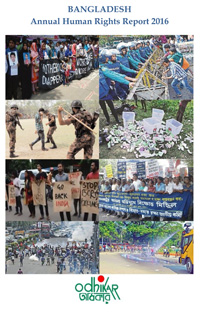- Category: Reports
Synopsis
After analyzing the contents of the 2016 annual report, it can be observed that there is a dearth of ethical and legal foundations of the government and its legitimacy is controversial, as a result of the contrived and fraudulent elections. In order to remain in power, the government has decided to use repressive ways and means, violating human rights and with disregard to rule of law. Although the influential States and development partners have verbally criticized this situation, in practice, they seemingly did not take any principle position for the sake of their business and trade interests with Bangladesh. Bangladesh ratified several international Treaties and Conventions, including the Rome Statute of the International Criminal Court and the International Covenant on Civil and Political Rights (ICCPR).

- Category: Reports
Odhikar believes that ‘democracy’ is a form of the State and presupposes that freedom and human rights are its foundations. Democracy is not merely a process of electing a ruler. Democracy is the result of the peoples’ struggle for inalienable rights, which become the fundamental premise to constitute the State defining collective aspirations and responsibilities. Therefore, the individual freedoms and democratic aspirations of the citizens – and consequently, peoples’ collective rights and responsibilities - must be the foundational principles of the State.
- Category: Reports
Odhikar believes that ‘democracy’ is a form of the State and presupposes that freedom and human rights are its foundations. Democracy is not merely a process of electing a ruler. Democracy is the result of the peoples’ struggle for inalienable rights, which become the fundamental premise to constitute the State defining collective aspirations and responsibilities. Therefore, the individual freedoms and democratic aspirations of the citizens – and consequently, peoples’ collective rights and responsibilities - must be the foundational principles of the State.
- Category: Reports
Odhikar believes that ‘democracy’ is a form of the State and not merely a process of electing a ruler. Democracy is the product of the peoples’ struggle for inalienable rights, which become the fundamental premise to constitute the State and to define collective aspirations and responsibilities. Therefore, the individual freedoms and democratic aspirations of the citizens – and consequently, peoples’ collective rights and responsibilities - must be the foundational principles of the State. The States failure to recognise this at the founding moment is a continuing curse that people are forced to carry. A State cannot be ‘democratic’ if the people do not realise and participate as ‘citizens’ in all sectors of the functioning of the state. The democratic legitimacy of the State is directly related to its commitment and capacity to ensure human rights, such as rights to life and livelihood, rights to environment and health; and the dignity and integrity of citizens. If all this is not ensured by the State, it cannot be called a ‘democratic’ state. These civil and political rights, as the foundational principles of the State, must remain inviolable; and accordingly, the Parliament, Judiciary and Executive cannot and should not have any power to abrogate them through any legislation, judicial verdict or executive order. The people’s inviolable rights are the foundational principles of the State.
- Category: Reports
This report, prepared over two years using information gleaned mostly from official State documents, portrays the state of impunity prevalent in Jammu and Kashmir. Where identities of individual perpetrators of crimes are known it seeks a process of accountability for institutional criminality.
In the highly militarized space of Jammu and Kashmir, it reveals an entrenched culture of impunity. Cases of human rights violations committed by members of various State forces are analyzed within the context of an occupation, an armed conflict, and a state of structural impunity. These have evolved within State institutions, including the armed forces, and traverse the application and interpretations of special laws, and finally the judicial system itself.
{aridoc engine="google" width="100%" height="800"}images/PDF/2012.12.11.alleged.perpetrators.report.IPTK-APDP.pdf{/aridoc}
